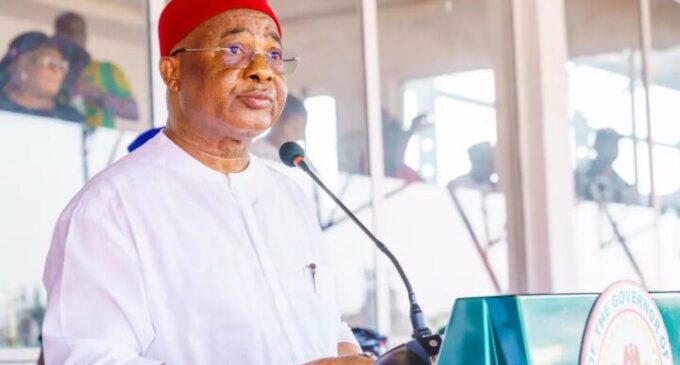Imo state industrial policy: One year after

At the start of his governorship, His Excellency, Senator Hope Uzodimma, CON – the Executive Governor of Imo State – set an ambitious goal of Reconstruction, Rehabilitation, and Recovery of Imo State. This strategy, which has been dubbed the 3R agenda, is strongly behind the State’s Industrial Policy launched on November 2, 2022 – exactly one year ago! The theme of the industrial policy, which also leans on the philosophy of the United Nations’ Sustainable Development Goals, is “making industries work for all”.
One thing is to have a policy, another is to implement it. The effective implementation of policies often rests on a solid foundation, which the socialisation of relevant critical stakeholders, especially through public enlightenment, is an essential part of. This socialisation involves setting the tone, drawing in necessary stakeholders, and building required capabilities and capacities for strategic execution. This is what the Imo State Government has intentionally and strategically pursued since launching the industrial policy – i.e., putting in place the necessary building blocks for a strong modern industrial economy.
In the last 12 months, the government, through the Office of the Chief Economic Adviser to the Imo State Government, has organised several public enlightenment programmes on the principles and potentials of the industrial policy. The socialisation of the policy is beginning to yield some good results, given the growing economic activities in the priority areas of the industrial policy. In addition to the public enlightenment programmes, the government is walking the talk and leading by example – especially in the priority areas of digital economy, agribusiness, oil and gas development, and provision of enabling industrial infrastructure necessary for industrial development.
Given the state of unemployment in Imo State, it is unsurprising that the industrial policy appropriately focuses on labour intensive sectors and prioritises such sectors as digital economy, agriculture, and fabrication. This accounts for the significant focus on youth economic empowerment exemplified in Senator Hope Uzodimma’s determination and commitment to train 300,000 Imo youths on digital skills for the global digital economy over a 3-year-period starting from January 2023. This is the SkillupImo programme, which is an essential part of the building block of a modern industrial economy.
To vigorously execute the digital economy focus of the Imo Industrial Policy, the Governor immediately created the first Ministry of Digital Economy and E-Government in Nigeria, and empowered it to deliver. One of the mandates of this ministry, in addition to skill development, is to provide robust telecommunication infrastructure in the State to support the Global Imo Agenda as the digital hub of Africa. The government has also created the “connected IMO Initiative” being driven as a PPP with the Heartland FibreOptics Nig. Ltd to facilitate the provision of broadband Fibre optics infrastructure across the 27 LGAs with Point of internet Access (PoIA) at public institutions like schools, Markets, LGA head offices, churches, hospitals and Community Centres as well as business districts in the state. The aim is to boost the drive towards achieving a smart and inclusive economy in the State.
The SkillupImo programme is a critical component of the Imo Digital Economy Agenda (IDEA) 2022-2026, anchored on six strategic pillars: Digital Literacy and Skill, Solid Infrastructure, Service Infrastructure, Advocacy, Monitoring and Evaluation, Collaboration and Partnership. The programme, which could be the largest initiative of this sort in Africa, is to enable our youths to participate in the global digital economy gainfully and productively from Imo State. This could be in the form of self-employment or other empowering forms of employment. With the target to train and engage 300,000 youths, even if the multiplier effect is as low as 4 extra persons positively affected per candidate (i.e., a couple with two children), which is actually a worst-case scenario, the programme stands a chance of positively impacting at least 1.2m Imo citizens economically. The anticipated spill-over effects to other sectors and initiatives are immeasurable.
Since its launch in January 2023, the SkillupImo programme has trained 20,000 Imo youths in basic, intermediate, and advanced digital skills and equipped them with Industry 4.0 tech skills and startup kits to enable them ply trade anywhere in the world.
Recently, too, and in line with the intention to curb unemployment, empower people economically, build capabilities, and further develop the agriculture sector, the Imo State government is encouraging every kindred/extended family in the State to consider creating an agribusiness. This is known as the One Kindred One Business Initiative (OKOBI). OKOBI is an ideology that fosters economic partnership and enhanced wealth growth among kindreds. Recognising the importance of kinship ties in economic development, and beyond the acronym, OKOBI can also be seen an amalgam of two Igbo words Oke, meaning great or real, and obi, place of living or a family. OKOBI provides a platform where individuals from the same family or lineage can collaborate and support each other in their entrepreneurial endeavours.
OKOBI addresses the challenges of poverty, informality, and unemployment. By leveraging the power of shared values, trust, and ancestral connections, OKOBI encourages kindreds to pool resources, share knowledge, and create opportunities for economic advancement. Through strategic partnerships, mentorship programmes, and access to capital, OKOBI empowers kindreds to build sustainable businesses, generate wealth, and strengthen the economic fabric of their communities. This approach, which is in line with the original social structure of the Igbo people through the “Umunna” and “Umuada”, has a significant potential of addressing the issues of unemployment and poverty from the grass root level upwards. And as intended, OKOBI is already generating significant interest amongst local people with kindreds starting businesses in farming, services, and manufacturing. These efforts can only grow the economy and expand revenue generation capability of the state.
The government has also invested heavily in market opening and job creating hard infrastructure. The massive road networks are already supporting businesses and creating jobs. In addition, the plan to dredge the ORASHI river and Oguta lake to the Atlantic Ocean, which was launched by the Governor in May 2023 and is already receiving international attention, will further open-up Imo State to the world, attract significant investments, and create many jobs – especially in the fabrication sector, which is one of the key priorities of the Imo industrial policy.
Enabling business environment has become a cliché and is over flogged. In my opinion, the issues are rather straightforward – i.e., the government in collaboration with non-State actors needs to provide hard infrastructure (e.g., roads and telecommunication enablers) and soft infrastructure (e.g., rule of law, quality education, fair taxes, et cetera). Often, the pursuit of enabling business environment is neglected because of perverse incentives and misaligned interests. It only takes political will and a good leader to drive this agenda. It is not a rocket science. In Imo State, for example, the Governor has prioritised the construction of rural and urban roads in the State – including major roads like Owerri-Orlu and Owerri-Okigwe roads which have been completed, and the Owerri-Mbaise-Umuahia road, which is nearing completion. These roads have eased the challenges of transportation, increased property value, and created new economic opportunities, amongst others.
Beyond hard infrastructure and enablers, businesses sometimes complain of multiple taxes and levies. To avoid such confusions and complaints, the government has recently banned anybody apart from the Imo State Inland Revenues Services from collecting taxes and levies from anyone. There are also constant legal and policy reforms to attract and retain investors. Recently, too, the Governor announced N5 billion revolving loan for farmers, and a good number of them are MSMEs, which will further support the efforts of the government to prioritise the agriculture sector of the Imo economy.
Notwithstanding, the Imo Industrial Policy is still very much work in progress and has been recognised as a good template by some states and indeed the federal government of Nigeria for adoption. The federal government, for instance, has recently launched a similar digital economy programme, and some states are considering OKOBI as an effective economic empowerment strategy. These are all positive signals.
In all, the Imo State Government has shown its willingness to walk the talk and translate her industrial policy into action strategically and intentionally. Nonetheless, continuation and sustainability matter! I, therefore, encourage other critical stakeholders – especially the private sector players – to help actualise the potentials of the policy for Ndi Imo, Nigerians, and Africans at large by creating a solid foundation for it. That way, the industrial policy will eventually meet its true goal of “making industries work for all!”
For the Imo State Industrial Policy, please see this link: http://i.imostatecea.ng/
Prof Amaeshi is a public philosopher, professor of sustainable finance and governance at the European University Institute, Italy, chair in business and sustainable development, University of Edinburgh, and visiting professor of leadership and financial markets in Africa at the London School of Economics, United Kingdom. He is also the Chief Economic Adviser to the Imo State Government (on pro-bono and part-time). He tweets @kenamaeshi
Views expressed by contributors are strictly personal and not of TheCable.


















There are no comments at the moment, do you want to add one?
Write a comment